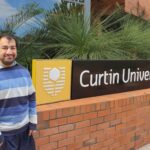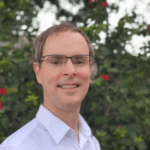Environmental biologist Cassandra Mair swapped corporate life for a big red truck and hit the road, travelling around the state to inspire children with the wonders of science. The experience ignited her passion for teaching and led to her enrolling in the Master of Teaching at Curtin.
We asked Cassandra about her journey towards teaching.
You started out in environmental biology and now you’re a primary school teacher. Why did you change your career?
I am very passionate about all aspects of the environment, particularly the land as a whole and graduated with an Environmental Biology degree from Curtin
I had fantastic opportunities during my studies, such as planting with Curtin Volunteers down in Margaret River. I also volunteered with both Perth Zoo and Armadale Reptile and Wildlife Centre as part of the Work Experience practicum.
I started out as a technician out in the field for a year and then landed a corporate consultant role which I worked in for three and a half years. During this time, I started losing my passion and there was less consultancy work, and in 2015 I was made redundant. At the time, I thought it was the worst thing to ever happen. But I took some time to think again what made me happy – that was still, of course, science.
I was super lucky to land a ‘statewide science presenter’ role at Scitech. This basically meant I was one of the people in the big red trucks, travelling all across Western Australia to run shows and workshops! After two years, I realised that educating children is what really made me happy. I enrolled in a Master of Teaching (Primary) and the rest is history.
I had completed my undergraduate degree at Curtin’s main campus, but this time I completed my studies online full-time, as well as working as an out-of-school-hours care educator and then as a kindergarten educator.
What advice do you have for someone considering a career change into teaching?
Life is too short to not make the changes for you! Take the plunge and study at Curtin. Teaching is extremely rewarding (and you get your steps up).
How did you juggle postgraduate study with other priorities e.g. paid work?
A weekly planner is your best friend. At the start of every study period, I put due dates, tutorial, lecture and practicum days into my diary. Each week I would write goals for myself. If I completed more than my goal, even better! The key is definitely making your goals achievable and not putting too much pressure on yourself. Ask the questions and be active in all your tutorials – all my professors were amazing and always willing to help you.
What were the most challenging and rewarding aspects of the course?
The biggest challenge was getting back into study, but you slowly find your own rhythm. As my course was online, it involved a lot of videoing and recording yourself. Hearing and seeing yourself on film is always daunting, but it ended up being great to reflect on how to improve in your pedagogy.
The practicums were rewarding and always a highlight, and the master degree offered four opportunities to practise all the aspects we learned in our theory units. I also met so many wonderful people that I still keep in touch with now. The ultimate reward was landing a job as a graduate teacher!

You were a Statewide Science Presenter at Scitech. Based on this experience, what are some of your top tips to help kids learn?
Our science program at Scitech was extremely hands-on and I incorporate this a lot into my everyday teaching. I know for one, that I was one of those students who struggled with worksheet after worksheet. There are so many great physical resources around that benefit students. Also, your passion rubs off on the kids. An engaging teacher engages students in learning!
What do you think makes a good teacher?
A good teacher is a teacher who builds the relationships with their students before diving head first into the curriculum. You just can’t expect all students to engage in their learning if the classroom environment isn’t inclusive and welcoming.
I’ve recently started as a year 4/5 teacher at Oakwood Primary School and our first week together involved team building challenges, writing an Acknowledgement of Country together and brainstorming on our classroom agreement (which we refer to for our behaviour management).
Anything you wish you had known prior to starting your first year as a teacher?
Put yourself out there, make the connections and be prepared to always be learning.
You will always feel busy as a teacher – there’s a lot to do, and of course, a lot to learn.
Take the time to look after your wellbeing.



